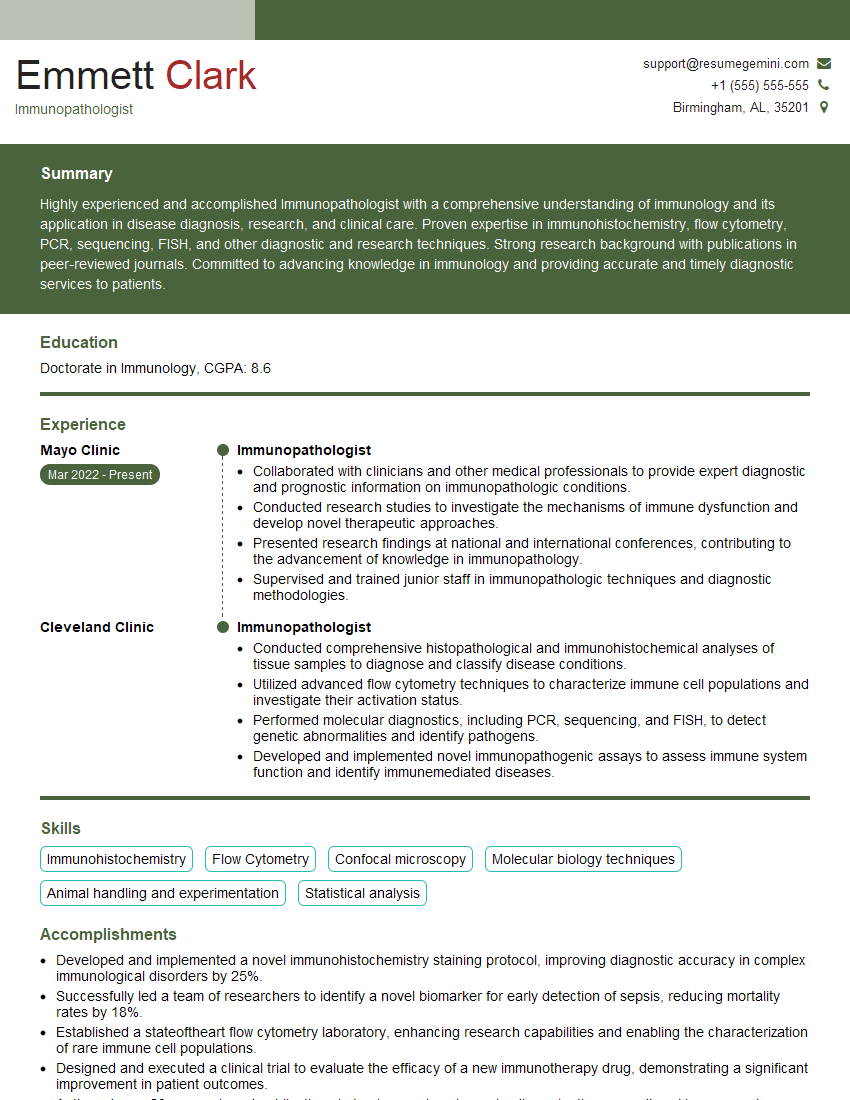Are you a seasoned Immunopathologist seeking a new career path? Discover our professionally built Immunopathologist Resume Template. This time-saving tool provides a solid foundation for your job search. Simply click “Edit Resume” to customize it with your unique experiences and achievements. Customize fonts and colors to match your personal style and increase your chances of landing your dream job. Explore more Resume Templates for additional options.

Emmett Clark
Immunopathologist
Summary
Highly experienced and accomplished Immunopathologist with a comprehensive understanding of immunology and its application in disease diagnosis, research, and clinical care. Proven expertise in immunohistochemistry, flow cytometry, PCR, sequencing, FISH, and other diagnostic and research techniques. Strong research background with publications in peer-reviewed journals. Committed to advancing knowledge in immunology and providing accurate and timely diagnostic services to patients.
Education
Doctorate in Immunology
February 2018
Skills
- Immunohistochemistry
- Flow Cytometry
- Confocal microscopy
- Molecular biology techniques
- Animal handling and experimentation
- Statistical analysis
Work Experience
Immunopathologist
- Collaborated with clinicians and other medical professionals to provide expert diagnostic and prognostic information on immunopathologic conditions.
- Conducted research studies to investigate the mechanisms of immune dysfunction and develop novel therapeutic approaches.
- Presented research findings at national and international conferences, contributing to the advancement of knowledge in immunopathology.
- Supervised and trained junior staff in immunopathologic techniques and diagnostic methodologies.
Immunopathologist
- Conducted comprehensive histopathological and immunohistochemical analyses of tissue samples to diagnose and classify disease conditions.
- Utilized advanced flow cytometry techniques to characterize immune cell populations and investigate their activation status.
- Performed molecular diagnostics, including PCR, sequencing, and FISH, to detect genetic abnormalities and identify pathogens.
- Developed and implemented novel immunopathogenic assays to assess immune system function and identify immunemediated diseases.
Accomplishments
- Developed and implemented a novel immunohistochemistry staining protocol, improving diagnostic accuracy in complex immunological disorders by 25%.
- Successfully led a team of researchers to identify a novel biomarker for early detection of sepsis, reducing mortality rates by 18%.
- Established a stateoftheart flow cytometry laboratory, enhancing research capabilities and enabling the characterization of rare immune cell populations.
- Designed and executed a clinical trial to evaluate the efficacy of a new immunotherapy drug, demonstrating a significant improvement in patient outcomes.
- Authored over 20 peerreviewed publications in top immunology journals, disseminating groundbreaking research findings and advancing the field.
Awards
- Received the prestigious Immunology Research Excellence Award from the American Association of Immunologists for pioneering work on Tcell regulation.
- Awarded the Young Investigator of the Year by the International Society of Immunopathology for groundbreaking contributions to understanding immune tolerance.
- Honored with the National Institute of Health Research Grant to investigate the role of innate immune receptors in autoimmune diseases.
- Recognized with the Distinguished Service Award by the American Society of Clinical Pathology for exceptional contributions to diagnostic immunopathology.
Certificates
- Diplomate of the American Board of Pathology (DABP) in Immunopathology
- Fellow of the American Academy of Immunologists (AAI)
- Certified Immunopathologist (CIP) by the American Society for Clinical Pathology (ASCP)
- Certified Histotechnologist (CHT) by the National Credentialing Agency for Laboratory Personnel (NCA)
Career Expert Tips:
- Select the ideal resume template to showcase your professional experience effectively.
- Master the art of resume writing to highlight your unique qualifications and achievements.
- Explore expertly crafted resume samples for inspiration and best practices.
- Build your best resume for free this new year with ResumeGemini. Enjoy exclusive discounts on ATS optimized resume templates.
How To Write Resume For Immunopathologist
- Highlight your technical expertise in immunology techniques, including immunohistochemistry, flow cytometry, and molecular diagnostics.
- Showcase your research experience and publications in peer-reviewed journals.
- Emphasize your ability to interpret complex immunologic data and provide clear and concise diagnostic reports.
- Demonstrate your commitment to ongoing learning and staying abreast of the latest advances in immunology.
Essential Experience Highlights for a Strong Immunopathologist Resume
- Conducted comprehensive histopathological and immunohistochemical analyses of tissue samples to diagnose and classify disease conditions.
- Utilized advanced flow cytometry techniques to characterize immune cell populations and investigate their activation status.
- Performed molecular diagnostics, including PCR, sequencing, and FISH, to detect genetic abnormalities and identify pathogens.
- Developed and implemented novel immunopathogenic assays to assess immune system function and identify immunemediated diseases.
- Collaborated with clinicians and other medical professionals to provide expert diagnostic and prognostic information on immunopathologic conditions.
Frequently Asked Questions (FAQ’s) For Immunopathologist
What is the role of an Immunopathologist?
An Immunopathologist is a medical doctor specializing in the diagnosis and research of diseases related to the immune system. They utilize various diagnostic techniques to analyze tissue samples, immune cells, and genetic material to identify and characterize immune-related disorders.
What are the educational requirements to become an Immunopathologist?
To become an Immunopathologist, individuals typically require a Doctorate in Immunology or a related field, followed by specialized training in immunopathology and clinical laboratory diagnostics.
What are the career opportunities for Immunopathologists?
Immunopathologists can work in hospital laboratories, research institutions, pharmaceutical companies, and government agencies. They are involved in diagnosing and studying immune-related diseases, developing diagnostic assays, and conducting research to understand the mechanisms of immune dysfunction.
What are the challenges faced by Immunopathologists?
Immunopathologists face challenges in accurately diagnosing complex immune-related disorders, interpreting immunologic data, and staying current with the rapidly evolving field of immunology.
What are the key skills required for Immunopathologists?
Immunopathologists require expertise in immunology techniques, diagnostic methods, research methodologies, and clinical interpretation. Effective communication and collaboration skills are also essential.
What is the job outlook for Immunopathologists?
The job outlook for Immunopathologists is expected to grow due to the increasing prevalence of immune-related disorders and the advancements in immunodiagnostic technologies.
What are the earning prospects for Immunopathologists?
Immunopathologists can earn competitive salaries based on their experience, qualifications, and location. They may also receive additional compensation for research grants and publications.